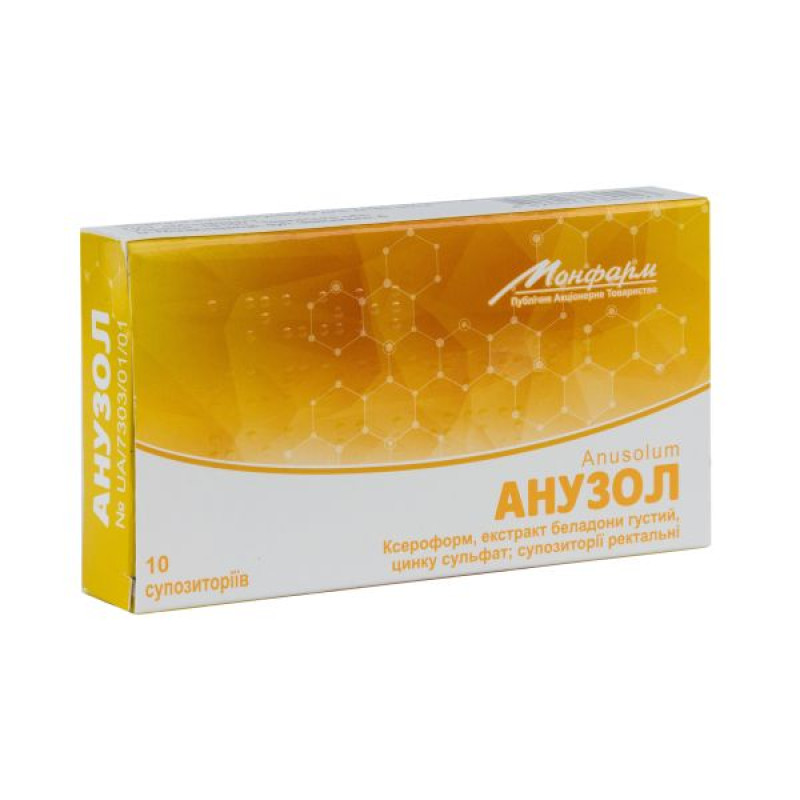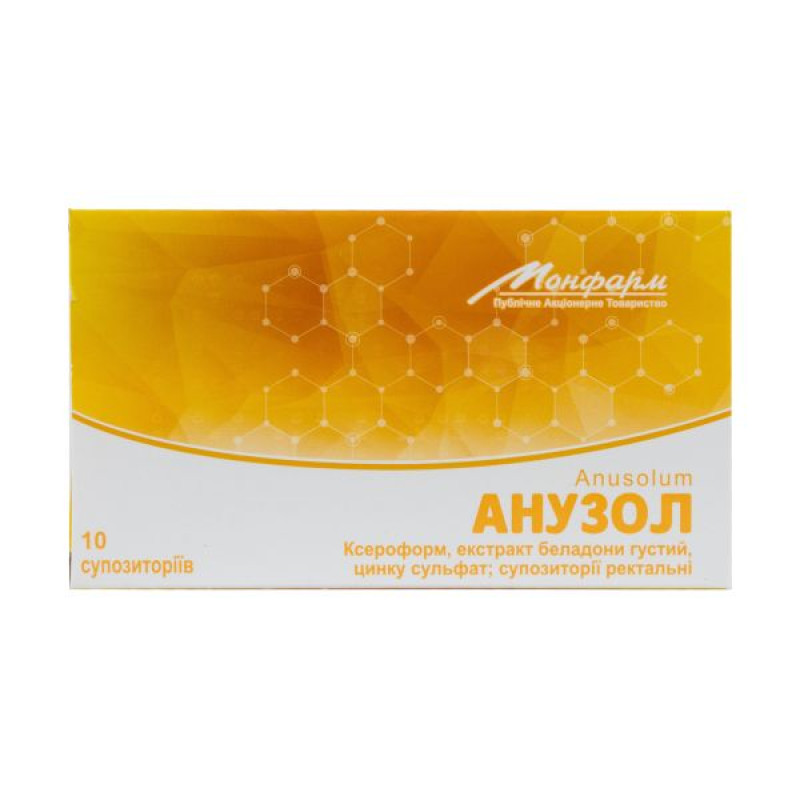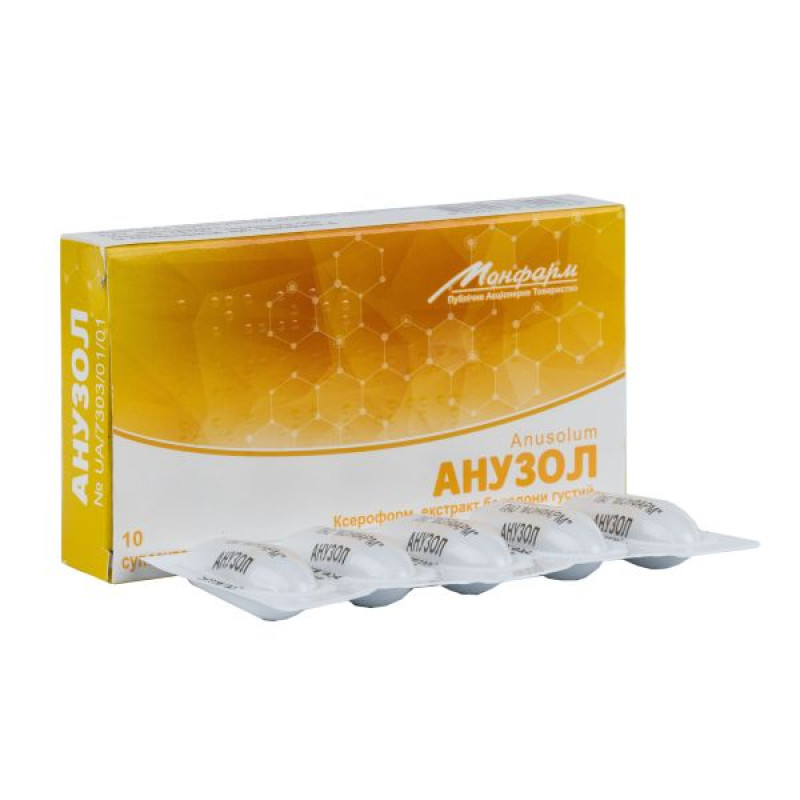Anuzol rectal suppositories strip No. 10

Instructions Anuzol suppositories rectal strip No. 10
Composition
active ingredients: xeroform, thick belladonna extract, zinc sulfate.
1 suppository contains xeroform 100 mg (0.1 g), thick belladonna extract (Belladonnae extractum spissum) calculated as the content of the sum of alkaloids 1.5% 20 mg (0.02 g), zinc sulfate 50 mg (0.05 g);
excipients: solid fat, glycerin.
Dosage form
Rectal suppositories.
Main physicochemical properties: suppositories are yellow with a brownish or greenish tint, with a xeroform odor. A barely noticeable white coating on the surface of the suppository is allowed.
Pharmacotherapeutic group
Topical treatments for hemorrhoids and anal fissures.
ATX code C05A X03.
Pharmacological properties
Pharmacodynamics
The properties of Anuzol are due to the effects of the ingredients that make up its composition, in particular antiseptic, astringent, drying, antispasmodic, and analgesic, which promotes the healing of wounds on the rectal mucosa.
Pharmacokinetics
When a suppository is inserted into the rectum, the effect of the drug appears after 15–90 minutes. The duration of the resorptive action of alkaloids ranges from 2 to 6 hours.
Indication
Hemorrhoids, anal fissures in adults.
Contraindication
Hypersensitivity to the components of the drug. Atrial fibrillation, tachycardia, chronic heart failure, ischemic heart disease, mitral stenosis, severe arterial hypertension. Acute bleeding. Thyrotoxicosis. Hyperthermic syndrome, gastrointestinal diseases accompanied by obstruction (achalasia of the esophagus, pyloric stenosis, intestinal atony). Angle-closure glaucoma. Hepatic and renal failure. Myasthenia gravis. Prostate adenoma in the stage of decompensation, acute urinary retention.
Interaction with other medicinal products and other types of interactions
When using the drug with monoamine oxidase inhibitors, cardiac arrhythmias occur; with quinidine, novocainamide - synergism of the anticholinergic effect is observed; with lily of the valley preparations, with tannin, a physicochemical interaction is observed, which leads to mutual weakening of the effects. Anuzol reduces the duration and depth of the action of narcotic drugs, weakens the analgesic effect of opiates. When used simultaneously with diphenhydramine or diprazine, the effect of atropine is enhanced; with nitrates, haloperidol, corticosteroids for systemic use - the likelihood of increased intraocular pressure increases, with sertraline - the depressive effect of both drugs increases, with spironolactone, minoxidil - the effect of spironolactone and minoxidil decreases, with penicillins - the effect of both drugs increases, with nizatidine - the effect of nizatidine increases, with ketoconazole - the absorption of ketoconazole decreases, with ascorbic acid and attapulgite - the effect of Anuzol decreases, with pilocarpine - the effect of pilocarpine in the treatment of glaucoma decreases, with oxprenolone - the antihypertensive effect of the drug decreases. Under the influence of Octadine, the hyposecretory effect of the drug may decrease, which weakens the effect of M-cholinomimetics and anticholinesterase agents. With simultaneous use with sulfonamide drugs, the risk of kidney damage increases, with drugs containing potassium - the formation of intestinal ulcers is possible, with non-steroidal anti-inflammatory drugs - the risk of stomach ulcers and bleeding increases. The effect of Anuzol may be enhanced with simultaneous use of other drugs with antimuscarinic effect: M-cholinoblockers, antiparkinsonian drugs (amantadine), antispasmodics, some antihistamines, butyrophenone drugs, phenothiazines, dispyramides, quinidine and tricyclic antidepressants, non-selective inhibitors of neuronal reuptake of monoamines.
Inhibition of peristalsis by Anuzol may lead to changes in the absorption of other drugs.
Application features
Use with caution in patients with prostatic hypertrophy without urinary tract obstruction; with Down syndrome, cerebral palsy; with reflux esophagitis; with hiatal hernia combined with reflux esophagitis; with nonspecific ulcerative colitis; with megacolon; in patients with xerostomia; in elderly or debilitated patients; in chronic lung diseases without reversible obstruction; in chronic lung diseases with low production of thick sputum that is difficult to clear, especially in debilitated patients; in autonomic (autonomic) neuropathy.
Use during pregnancy or breastfeeding
Contraindicated.
Ability to influence reaction speed when driving vehicles or other mechanisms
Given the possibility of side effects such as dizziness, hallucinations, and accommodation disorders, you should refrain from driving or operating other mechanisms while using the drug.
Method of administration and doses
Apply rectally. Enter into the rectum - 1 suppository 2-3 times a day. Maximum daily dose - 7 suppositories. Duration of use depends on the severity of the disease and the severity of the therapeutic effect.
Children
Do not apply.
Overdose
Symptoms: increased manifestations of adverse reactions, nausea, vomiting, decreased blood pressure, agitation, tremor, convulsions, insomnia, drowsiness, hallucinations, irritability, hyperthermia. Central nervous system depression, inhibition of the activity of the respiratory and vasomotor centers, urinary retention, hyperthermia.
Treatment. Gastric lavage, parenteral administration of cholinomimetics and anticholinesterase agents. In case of hyperthermia, wet wipes and antipyretics are indicated; in case of excitement, intravenous administration of sodium thiopental or sodium oxybutyrate; in case of mydriasis, topically in the form of eye drops of phosphacol, physostigmine, pilocarpine. In case of a glaucoma attack, immediately instill 2 drops of 1% pilocarpine solution into the conjunctival sac every hour and subcutaneously inject 1 ml of 0.05% proserin solution 3–4 times a day.
Adverse reactions
Gastrointestinal disorders: dry mouth, thirst, taste disturbances, dysphagia, decreased intestinal motility up to atony, decreased tone of the biliary tract and gallbladder, constipation, diarrhea.
Renal and urinary disorders: difficulty and retention of urination.
Cardiac disorders: tachycardia; palpitations; arrhythmia; including extrasystole; myocardial ischemia.
Vascular disorders: facial flushing, feeling of hot flushes.
Neurological disorders: headache, dizziness, nervousness, insomnia.
Visual disturbances: mydriasis, photophobia, accommodation paralysis, increased intraocular pressure, temporary visual disturbances.
Respiratory and mediastinal disorders: production of viscous sputum that is difficult to cough up.
Skin and subcutaneous tissue disorders: skin rash, urticaria, exfoliative dermatitis.
Immune system disorders: anaphylactic reactions, anaphylactic shock.
Others: decreased sweating, dry skin, dysarthria, burning sensation in the anus.
If any adverse reactions occur, you should consult a doctor.
Expiration date
2 years.
Storage conditions
In the original packaging at a temperature not exceeding 25 ºС.
Keep out of reach of children.
Packaging
5 suppositories per strip. 2 strips per pack.
Vacation category
Without a prescription.
Producer
PJSC "Monpharm".
Location of the manufacturer and address of its place of business
Ukraine, 19161, Cherkasy region, Uman district, Avramivka village, Zavodska st., 8.
There are no reviews for this product.
There are no reviews for this product, be the first to leave your review.
No questions about this product, be the first and ask your question.








